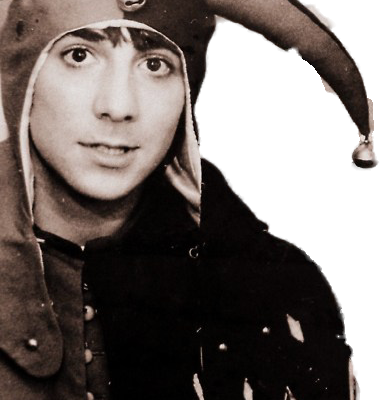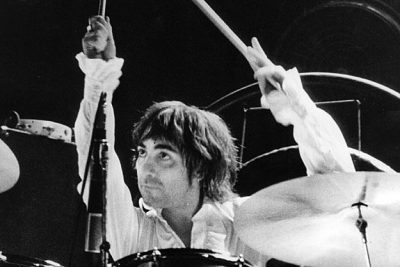A short story by Jack Somers
October 9, 2021
Support independent, non-corporate media.
Donate here!

Silas lifted the shoes out of the unmarked cardboard box and inspected them. He could see that the auction web site hadn’t missed a detail. Mild scuffing and discoloration on both soles. One missing eyelet. Torn fabric on the inner left heel. A dark, dime-sized stain that might have been blood on the fabric just above the right toe box. All in all, a slightly battered but perfectly wearable pair of green low-top Converse.
“Those are the shoes you dropped nine hundred dollars on?” said Greer as she passed through the foyer.
“They belonged to Keith Moon…the drummer for The Who.”
“I know who Keith Moon is. Or was.” She flopped down on the sofa in the den, picked up the remote, and turned on the TV. “That’s still a lot of money. I wouldn’t pay that much for a pair of shoes, even if they’d belonged to John Lennon.”
God, he’d make a mistake marrying her, he thought. If he’d known she preferred The Beatles to The Who when they’d first met, he never would have proposed. “Lennon was a songwriter,” he said. “Moon was a force of nature.”
“If by ‘force of nature’ you mean drunken lunatic who smashed up hotel rooms for no apparent reason and drove cars into swimming pools, then yes, he was a force of nature.”
Silas set the shoes side-by-side on the floor, loosened the laces, and tentatively slipped his feet into them. They fitted well. “I’m going to wear these to school tomorrow,” he said.
“Don’t you have to wear leather shoes?”
“I’ve followed the dress code long enough.”
On the way to school the next day, he listened to “Baba O’Riley” three times in a row. On the first listen, he hammered out the basic beat on his steering wheel. On the second, he played the beat again but threw in a few counter-beats and rapid-fire drum rolls. On the third, he spontaneously launched into a series of elaborate syncopated fills, slapping his hands not just on the steering wheel but on the console, the gearshift, and the door handle. He’d never felt so locked into the groove. He’d never felt so in control of his own movement. It was exhilarating. It was like flapping your arms and discovering you could fly.
At school, he exhumed an old Panasonic TV with a built-in DVD player from the back of a closet in the AV department, mounted it on a cart, and wheeled it to his classroom. As he plugged it into the outlet behind his desk and switched it on, his ninth-grade students eyed the relic with curiosity.
“Today, guys, we’re going to take a break from Beowulf,” said Silas. “I have a special treat for you.”
He pulled a DVD out of his satchel and fed it into the TV. The screen brightened, and a crowd appeared—thousands of long-haired, denim-clad kids clapping and shouting and flashing two-fingered peace sign salutes. The camera zoomed in on a spotlit stage where the members of The Who were waiting, poised to perform. Over on the right, Pete Townsend windmilled an arm at his devil-horned guitar, and the band ripped into its first number. At the center of the stage, Roger Daltrey, decked out in leather fringe, rocked back and forth on his four-inch heels and whipped his microphone around like a lasso. On the left, John Entwistle loomed, one hand plucking deftly at his bass strings while the other zipped up and down the fret board. Behind them all, Moon, wide-eyed and open-mouthed, punished his drumkit with barrage after barrage of merciless blows. Silas grabbed the remote and cranked the volume.
“This,” he shouted, “is The Who at the Isle of Wight Festival in August of 1970. Some say this was their best concert, but personally I think their performance at Leeds was superior. Still, this gives you a good idea of how tight they were as a live act around this time.”

He fished two pens out of the glass jar on his desk and began drumming the side of the TV cart in time with the music. “You’ll see the drummer, Keith Moon, is in top form here. He doesn’t just stick to the snare and the hi-hat like most drummers of his era. He’s all over the kit. He treats the drums like a solo instrument. That was his great innovation. All the virtuoso drummers who came after him—Neil Peart, John Bonham, Stewart Copeland—they all owe a huge debt of gratitude to Moon.”
The floor began to rumble.
A gray-haired man in pleated khakis and a powder blue V-neck sweater materialized in the doorway. He waved his arms at Silas like he was trying to land a plane with semaphore.
Silas pocketed his pens and paused the film. “Yes?”
“Could you please turn that down, Mr. Ackerly? I’m giving a test next door.”
“Of course,” said Silas. “In fact, how about I just turn it off. In fact…” He unplugged the TV and hefted it off the cart. “How about I just get rid of it all together.” He carried the TV across the classroom and, in one swift motion, heaved it out the open window. “Anything else I can do for you, Mr. Hopper?”
The students gaped.
“How about a little redecorating?” said Silas. “Would you like that?” Before the older man could answer, Silas was off. He tore down all six of his posters. He flung over his bookshelf. He pitched his trash can across the room and swept the papers and books off his desk. He dislodged the overhead projector from its ceiling mount and smashed it against the whiteboard. “How’s that, Mr. Hopper? Better, don’t you think?”
“You’ve lost your mind,” said Mr. Hopper.
“Not so,” said Silas. “I feel more clear-headed than ever.”
Driving home, he listened to “My Generation” on repeat and scanned the road for a place to get a drink. He was trying to decide if he would start with whiskey or brandy when he heard the bleep-bleep of a police siren. He knew he was speeding, but he’d never seen police on this stretch of road before. Today, he’d assumed, would be no different.
“Come on then,” he said aloud, and stomped the gas pedal.
The speedometer arm raced through its arc—sixty-five, seventy, seventy-five. The scenery on either side of the road blurred. How wonderful would it be if he went so fast that his car left the ground like a plane on the runway, if he shot up into the air, leaving the policeman far behind? He would jet through the clouds until he was out over the ocean where no police could get him. Then he would come down gently, settle on the waves, bob around in an endless expanse of blue. That would be peace. That would be nirvana. Out of the corner of his eye, he caught a glimpse of blue, a slice of ocean, and swung his steering wheel hard.
The car crashed through a low hedge, blasted through a wooden fence, and thudded to a halt in an explosion of white spray. Through the windshield he watched water rise over the car’s headlights and devour the hood. Frantically, he lowered his window. Water rushed into his lap. Its coldness, its heaviness, its power startled him. He unbuckled his seatbelt and maneuvered his feet onto the seat so he could push himself out the window. In no time his head and shoulders were out, but he could go no further. Something had him by the shoes.
Suddenly the water was over his head. It needled his eyes and burned his nostrils. It whooshed down his throat as he let out a yelp. The acrid, chemical tang of chlorine filled his mouth. He was in a pool. He was going to die in a pool. The indignity of it galvanized him, filled him with fight. He had to get loose. He shimmied his body back through the window and found that the toes of his shoes were caught between the seat and the armrest. He reached for his laces and began furiously untying. A few seconds later, his feet were free.
He surfaced just to the left of the diving board, rested his arms on the pool deck, and vomited half a liter of water. A square-jawed, middle-aged policeman peered down at him, his expression grave.
“What happened?” said Silas. “Where am I?” He truly had no idea.
“You’re in the pool at the Holiday Inn,” said the officer. He retrieved a pair of handcuffs from his back pocket and held them over Silas’s head. “Now get on out of there.”









